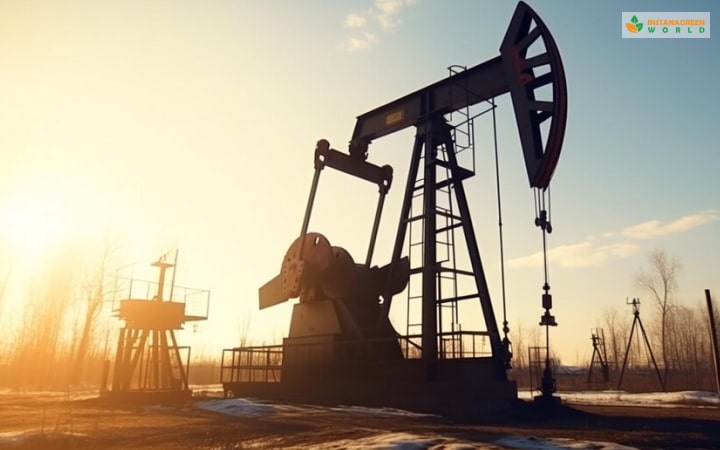Petroleum, commonly known as oil, has been a cornerstone of the global energy landscape for over a century. It fuels our cars, powers industries, and forms the basis for countless products we use in our daily lives.
However, a fundamental question remains: Is petroleum truly a fossil fuel? To answer this question, we must delve into the origins, formation processes, and scientific understanding of petroleum.
Understanding The History Of Fossil Fuel

Fossil fuels are hydrocarbons, primarily coal, fuel oil, or natural gas. It is a creation from the remains of dead plants and animals over millions of years. The key characteristic of fossil fuels is their origin from the fossilized remains of ancient organic matter. Predominantly from the Carboniferous period.
The Formation Of Petroleum

Petroleum, like other fossil fuels, is believe to have originated from the remains of marine microorganisms millions of years ago.
These microscopic organisms, mainly algae and plankton, lived in ancient oceans and seas. When these organisms died, their remains settled on the ocean floor, forming a layer of organic-rich sediment.
Over time, as more layers of sediment accumulated, the organic material underwent a process known as diagenesis. This involves the physical and chemical transformation of organic matter into kerogen, a solid, carbon-rich material. This initial step is crucial for the subsequent formation of petroleum.
Is Petroleum A Fossil Fuel?

The term “fossil fuel” implies a direct connection to ancient life forms. In the case of coal, it is derived from the remains of plants that lived millions of years ago.
Similarly, natural gas and oil are associated with ancient marine microorganisms. While petroleum shares the organic origin characteristic with other fossil fuels, some scholars argue that it does not meet the strict definition of fossils.
Fossils, in the traditional sense, are the preserved remains or traces of animals, plants, and other organisms from the past geological age. Petroleum, on the other hand, is not the direct result of the preservation of ancient organic matter but rather the transformation of this matter into hydrocarbons over geological time.
Scientific Studies And Alternative Theories

The question of whether petroleum is truly a fossil fuel has sparked scientific debate, leading to the proposal of alternative theories, such as the abiogenic theory.
This theory posits that hydrocarbons can form from inorganic sources deep within the Earth, independent of organic matter.
According to the abiogenic theory, the Earth’s mantle contains carbon compounds that, under high temperature and pressure conditions, can generate hydrocarbons. These hydrocarbons then migrate towards the Earth’s crust, where they can accumulate in reservoirs.
While the abiogenic theory challenges the conventional understanding of fossil fuels, it remains a minority view within the scientific community.
Most geologists and geochemists support the biogenic origin of petroleum, emphasizing the evidence of isotopic signatures and molecular structures consistent with organic sources.
Challenges To The Abiogenic Theory
While the abiogenic theory has its proponents, it faces several challenges. One significant challenge is the lack of direct observational evidence for the generation of hydrocarbons from inorganic sources within the Earth’s mantle. Additionally, the geological processes required for the migration and accumulation of abiogenically generated hydrocarbons remain unclear.
Spoiler Alert! Does Petroleum Come From Dinosaurs?

The common belief that petroleum comes from dinosaurs is a misconception. While the idea of fossil fuels being derived directly from the remains of dinosaurs is widespread in popular culture, the actual process of petroleum formation involves different organic materials and a much longer geological timeline.
Petroleum, or crude oil, is primarily formed from the remains of ancient marine microorganisms, such as algae and plankton, rather than land-dwelling dinosaurs.
Organic Matter Accumulation
Millions of years ago, marine microorganisms lived in ancient oceans and seas. When these organisms died, their remains settled on the ocean floor, along with other organic debris.
Sedimentation
Over time, layers of sediment accumulated over the organic material, creating an environment where the organic matter could be preserved and buried.
Diagenesis And Kerogen Formation
The buried organic matter undergoes a process called diagenesis, where heat and pressure cause the physical and chemical transformation of the organic material into a solid, carbon-rich substance known as kerogen.
Catagenesis And Petroleum Formation
As burial continues, increased heat and pressure cause further transformation of the kerogen into liquid hydrocarbons. This process, known as catagenesis, leads to the formation of petroleum, which includes crude oil and natural gas.
Migration And Accumulation
The generated petroleum migrates through porous rocks until it reaches reservoir rocks, where it can accumulate. Reservoir rocks, such as sandstone, have high porosity and permeability, allowing them to hold significant quantities of petroleum.
It’s important to note that this process takes millions of years, and the resulting petroleum is a complex mixture of hydrocarbons. The formation of petroleum is primarily associated with the organic material derived from marine microorganisms, not land-based organisms like dinosaurs.
The misconception likely stems from the fact that both petroleum and dinosaurs are associated with ancient times. However, the time periods during which dinosaurs roamed the Earth (Mesozoic Era).
The subsequent formation of petroleum (primarily during the Paleozoic and Mesozoic Eras) do not directly overlap. The organic material that ultimately gives rise to petroleum mostly predates the existence of dinosaurs.
Wrapping Up!
Well, there you go with this detailed explanation; it is very well justified the initial question, is petroleum a fossil fuel?
The answer to that question is not that easy since fossil fuel is made from the remains of organic matter. While petroleum is not directly a result of the preservation of ancient organic remains, it is formed when this organic matter transforms into hydrocarbons with time.
Read More…
What Is Natural Gas? Types, Facts, And Figures
Types Of Renewable Resources: The Future Of Energy












